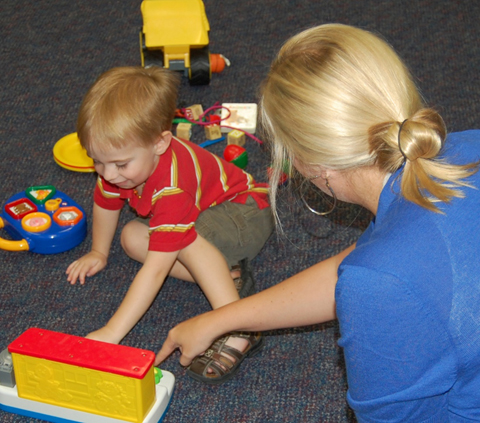Vanderbilt TRIAD Introduces Novel ASD Training Program for Pediatric Medical Residents
April 21, 2020

|
Providers and researchers at Vanderbilt University Medical Center have developed a novel training program to enhance pediatric medical resident training in the area of autism spectrum disorder (ASD) and other neurodevelopmental disabilities. A collaborative team of expert physicians and psychologists (through the Vanderbilt Kennedy Center's Treatment and Research Institute for Autism Spectrum Disorders [VKC/TRIAD]) designed the program to give residents a clear methodology and decision pathway regarding how and when to use interactive diagnostic tools within practice and how to provide diagnostic feedback to concerned caregivers.
Pediatricians have the opportunity to both assess and connect toddlers with ASD-related care; however, they often report insufficient training regarding tools/methods for risk assessment, ways of talking about diagnostic risk or uncertainty with families, and methods of providing follow-up care. With few exceptions, most medical education programs do not currently provide residents with specific, applied training in the evaluation, diagnosis, and management of young children with ASD-related concerns. As a result, many practicing pediatricians as well as medical residents (whose training programs serve over 20% of American children living in poverty) feel unprepared to provide ASD-related care within current training models and will likely carry this uncertainty forward into future practice. This represents a tremendous training gap that, in turn, is also a tremendous opportunity for service system intervention.
Researchers are finding that it is necessary for residents to learn and deploy newly developed skills in a supported environment, with opportunities for follow-up supervision and consultation, to increase their acceptance within their future work setting and contribute to meaningful reductions in the age of ASD diagnosis over time. This has shaped novel training implementation in two ways. First, the model intervenes on existing programs shifting the learning paradigm from knowledge-based shadowing and passive exposure to specific, active and supervised within-practice learning. Specifically, it offers applied learning experiences through participation in an early ASD diagnostic clinic during the Developmental Behavioral Pediatrics (DBP) rotation. Second, the model embeds these new learning paradigms for action within and across a medical home learning model designed to ensure ongoing practice support, opportunities for enhanced competency, and a collective ownership/responsibility for care of young children with ASD. This includes hands-on, psychologist-supervised training in brief within-practice ASD assessment tools within the resident training continuity clinic.
To supplement their hands-on training, residents also complete an online interactive toolkit that teaches them how to support families through the process of obtaining a school-based evaluation, creating individualized goals capable of being monitored over time, and accessing and advocating for needed services. The toolkit also provides a library of handouts, including resources for residents seeking additional information and practical documents for families that can be used during the evaluation process. Information from the toolkits are being adapted for use in busy clinic settings by adding actionable features within the Medical Center's electronic medical record platform. These features help guide providers' questioning and offer guidance around school-based services during clinic visits.
Pediatricians are often the first point of contact for families who have questions about ASD. This novel, hands-on residency training program that specifically targets ASD-related areas of competency holds the potential to train a new generation of community pediatricians to provide family-centered care within a developmentally sensitive medical home. From early identification of developmental risk to linking families to early intervention to navigating the process of obtaining school-based supports, the partnership between VKC TRIAD and Vanderbilt University Medical Center strives to give residents the training they need to provide supported autism care.
[1] Centers for Disease Control and Prevention (2018). Screening and Diagnosis for Healthcare Providers. Retrieved from https://www.cdc.gov/ncbddd/autism/hcp-screening.html on June 1, 2018.
[1] Krugman SD, Racine A, Dabrow S et al. (2007). Measuring primary care of children in pediatric resident continuity practices: A Continuity Research Network study. Pediatrics;120:e262-e271







